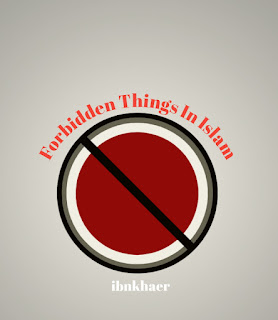In Islam, there are several acts that are considered forbidden (haram) due to their harmful nature, violation of divine laws, or detrimental effects on individuals and society. Indeed, there are several actions and behaviors that are strictly prohibited (haram) in Islam, as outlined in the Quran and the Sunnah (teachings and practices of the Prophet Muhammad, peace be upon him). Here are some examples of haram actions that Muslims should avoid:
1. Shirk (Associating Partners with Allah): The gravest sin in Islam is associating partners with Allah (shirk), which contradicts the fundamental principle of monotheism (Tawheed). Worshipping anything or anyone other than Allah is strictly prohibited.
2. Major Sins (Kaba'ir): Certain major sins are explicitly mentioned in the Quran and Hadith, including adultery (zina), consumption of intoxicants (khamr), theft, usury (riba), false testimony, disobedience to parents, and murder.
3. Violence and Oppression: Islam prohibits violence, oppression, and aggression against others, including acts of terrorism, unjust warfare, and the mistreatment of vulnerable groups such as women, children, and minorities.
4. Backbiting and Slander: Speaking ill of others, spreading rumors, backbiting, and slander are condemned in Islam. Muslims are instructed to guard their tongues and refrain from harming others with their words.
5. Consumption of Prohibited Foods: Muslims are prohibited from consuming certain foods and drinks, including pork and its by-products, blood, carrion, and animals not slaughtered according to Islamic guidelines (halal).
6. Usury (Riba): Engaging in usurious transactions, charging or paying interest on loans, and exploiting others through unjust financial practices are considered forbidden in Islam.
7. Idolatry and Superstition: Practices involving idol worship, superstition, sorcery, and divination are contrary to Islamic monotheism and are therefore forbidden.
8. Injustice and Corruption: Islam emphasizes justice, fairness, and integrity in all aspects of life. Corruption, bribery, fraud, and dishonesty are condemned as they undermine societal harmony and moral values.
9. Disrespect for Parents and Elders: Islam places great emphasis on respecting and honoring parents, elders, and authority figures. Disobedience, disrespect, or mistreatment of parents is considered sinful.
10. Engaging in Extramarital Relations: Adultery (zina) and fornication are prohibited in Islam. Sexual relations are only permitted within the bounds of a lawful marriage between a husband and wife.
11. Forcing your Wife: Forcing your spouse is one of the biggest sins you will ever commit. Our beloved Prophet Muhammad (PBUH) has taught us to be very friendly with your Wife, even stated that make her your best friend!
These are just a few examples of the forbidden acts in Islam. Muslims are encouraged to avoid these actions and strive to adhere to the teachings of Islam, which promote righteousness, morality, and ethical conduct in all aspects of life.

جزاك لله خير
ReplyDelete